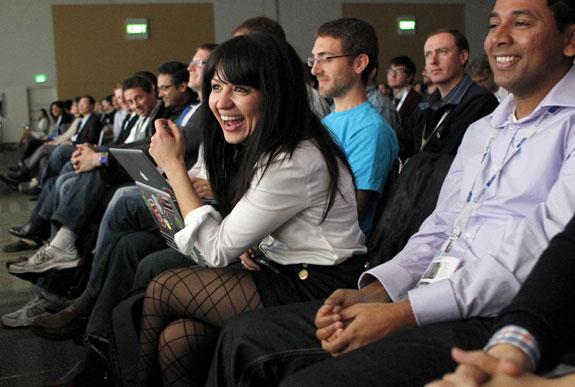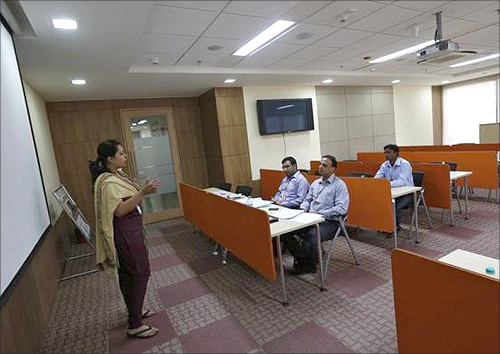Photographs: Beck Diefenbach/Reuters Varsha Adusumilli, Courtesy Yourstory.in
"There is no glass ceiling. It is a myth. If it exists, it is in your head. I have worked in the IT industry for the last 27 years, and I know it doesn’t exist. Our growth rates are so high, our industry is so hungry for talent, why would there be any discrimination? Get over this."
"Wipe out any guilt today. Even if you have an iota of it, you will hesitate."
Read on for Capgemini India CEO Aruna Jayanthi’s uncoventional mantras for strong leadership in her own words:
For me, the issue of leadership is a generic one.
There is no different mantra for women and men.
Of course, men bring different strengths to the table and women bring different strengths to the table, but the fundamental principles of leadership remain same.
Let us talk about what makes each one of us good leaders and how we can raise to the top positions in the IT industry.

How can you have a broader view of your career?
The first principle is about looking at the big picture.
When I started my career in IT, I joined right after business school and I was expecting consulting type of roles, but the first assignment I had was maintenance.
I was miserable. I thought all the cool jobs went to everybody else and I thought I should be little above everybody else because I came out of business school. I complained bitterly for two weeks trying to get my role changed.
My manager one day called me and said, "Can you just shut up and get on with it. Five years from now, you will be very happy that I said this to you. You can learn far more from doing this than anything else, so be quiet and do your job."
I did it for 18 months and I will tell you today that I will never forget the person who gave me that advice.
When you are 21 years old, you won"t have the ability to look at the big picture, but at least be patient.
If you look at a career span of 30 years, 12 months or 18 months don't matter. You should learn from every role that you have, learn from it and get on with it.
Last week, I met with someone who had grown to become the head of an engineering company. So when she started in the 70s, women were not even welcomed on the shop floor.
The company did everything possible to get her out.
They finally gave her housekeeping, and she did such a great job that the company won multiple awards in Pune for the most beautifully maintained gardens. Later on of course she moved to other roles within that company, and she grew to become the head of the company over the years!
Too many of us make decisions which are based on short-term goals.
"I don't like this job at hand right now, let me go somewhere else"
I am not sure this is always the right way to look at things. You have to take a much broader view of your career.
I am not saying that people should not change jobs; you can and you should. But take a much broader view of your career, and focus on the big picture.

Please click NEXT to continue reading...
Short-term breaks and sabbaticals are okay
Image: For representational purposes onlyPhotographs: Adnan Abidi/Reuters
One of the big issues we have today is, women dropping out of jobs post maternity leave.
It is okay to take that leave, because you need to take care of yourself and your child.
Some people come and tell me, "Can I take six months off?"
It is absolutely okay. To me, the principle remains the same, one year break means nothing, it absolutely means nothing.
But unfortunately in the industry that we are in, we often hear "Oh my god, she is taking one year off, is she up to it, is she serious?"
And I tell people that, if a person has been with us for five years and is good, if s/he wants to take a few months off and come back, it is our responsibility to get that person re-skilled and bring that person back into the organisation. Because at the end of the day, we are all so short of good talent.
I think we need to change both individual's thinking as well as organisational mindset. Be confident that you are doing nothing wrong by taking off. There needs to be a change in the way organisations look at bringing women back from that short period of break.
One woman who works directly with me took three years off, and she runs one of our major P&Ls today!
So my message is, short term changes and sabbaticals do not matter at all.
What makes strong leaders?
Image: For representational purposes onlyPhotographs: Rediff Archives
Conviction. I see so many people who come to work because they have to come to work.
When I am hiring for a big project, I look for just one thing, and that is how convinced someone is and do they have fire in the belly.
Is that person convinced enough and committed enough to not to give me an excuse.
It is so easy to see a project fail and give ten different excuses for why something didn't work.
I look for people who say, "I don't care about the environment, but I will make it work."
In a recent interview, I met someone who was ready to put his entire salary on the line; without hesitation I took him. To be strong leaders, you need to be very passionate and committed.
What does it take to succeed?
Another thing that is true of this industry is that, you are not doing a 9 to 5 job.
You have to be available to network. You have to be available to meet customers on weekends. You have to do so much more to succeed.
The way I manage it, and the way I expect my teams to manage it is, "Go get the job done, who cares whether you come to office at 7 or you don't come to office at all."
We have to all think about our work styles and lifestyles differently now. The whole industry has changed and we all have to rewire ourselves accordingly.
When I am not travelling, I am home by 7 in the evening, and I spend time with my family, I work again from 10:30 for at least two hours or so. It is all about how you manage your priorities.
And finally, one has to have fire in the belly and a strong desire to succeed -- without that you don't get anywhere.
I want to close by saying that, everything is up to the individual, there are no limitations in our industry.




Comment
article